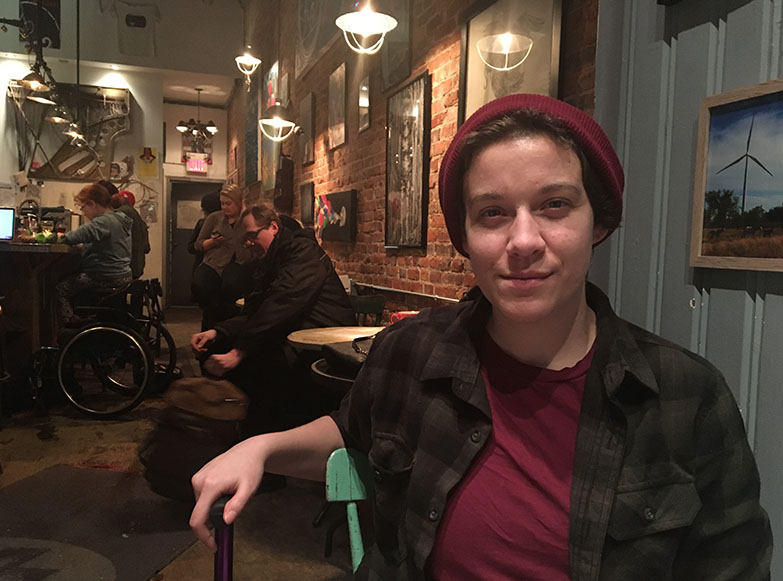
Inali Barger has been writing poetry for as long as he can remember, and has been performing onstage for audiences for nearly 11 years. Photo by Kayla Haggett, QNet News
By Kayla Haggett [1]
KINGSTON – A London-based spoken word artist stopped in Kingston last week to talk to local poets about the power poetry has to bring people together.
It was part of a writing workshop on Tuesday with spoken word artist Inali Barger about poetry as a way of knowledge translation – that is, taking an individual’s experiences and making them meaningful to others via accessible language. The event was hosted by the Kingston Poetry Collective [2], a group that formed in May 2015 and hosts shows and workshops in the city.
Andréa Prins, one of the founders and organizers for the collective, described the purpose of the group as creating space for “verbal wizardry, emotional exhibitionism and community mind melds.”
“There is a kind of verbal alchemy that happens when people spill their guts and are so completely honest and vulnerable with each other,” said Prins. “There’s just such an intense bond that forms when people express the deepest parts of themselves, and you can connect with people on such a deep level.”
Barger is a 27-year-old living in London, Ontario who has been performing his poetry onstage for almost 11 years. He’s been taking part in the London Poetry Slam since he moved to the city at 17, and now works to help organize the event and mentor younger poets. He’s also done work with mindyourmind [3], a London-based website aimed towards mental health and wellness.
The workshop on Tuesday took place in the Kingston Community House [4], and discussed the idea of knowledge translation through poetry – which, according to Barger, means taking an experience that is personal and unique to the individual, and making it accessible to a room of people by using language everyone can understand.
The group discussed languages throughout the two-hour workshop session, but they weren’t talking about English or Mandarin.
When Barger referred to languages, he said he meant the way people communicate based on their own life context and experiences.
For example, he said that his own experiences with poverty, homelessness, disability, addiction, mobility issues, etc., have informed his own “language” and how he communicates things onstage. Barger is also hard of hearing. He says that his need to ask people for help, for example asking someone to help him while lipreading, and his need to advocate for himself means that he talks to strangers more and is able to listen to others more patiently.
“All of these things have impacted my work, because I hear more stories, I hear more languages, and then I have more languages that I need to account for when I write,” said Barger.
This use of accessible language and metaphor can be simple as well – to help explain his point, Barger used the example of describing a burn in a poem by calling it a “marshmallow-degree burn”.
“A marshmallow-degree burn is much better than a third-degree burn,” said Barger, “because I don’t know if someone knows the difference between a first, second and third-degree burn, but I’m pretty sure they’ve burnt a marshmallow before.”
The listener can then use their own experiences and sensory knowledge to more clearly picture the experience of the poet, he said.
A poetry slam or spoken word event brings together people from all different walks of life, said Barger, and having those people in the same space discussing their experience in a similar language allows the room to access each other’s experiences.
“And then you’ve suddenly broken down one of the silos, of many silos in the city,” said Barger. “That’s almost even more important in rural communities where there are so few resources, that you have to connect, you have to know what everyone offers, so that you can pool the resources and try to support people in whatever creative means you can figure out.”
Both Barger and Prins described spoken word as being a symbiotic relationship; to Barger, a poem needs to offer the audience something as well.
If a poet is using poetry as a way of healing, it needs to also be healing in some way for the audience, said Barger, otherwise the audience is just left to deal with the emotional baggage of the poet.
“Poets used to joke all the time that slam is cheap therapy – it’s not,” said Barger. “It should not be used as such, it does not make the space safe for anyone.”
Rather, spoken word should offer something to the audience, such as a tool that they can use to affect change in their community. To Barger, this could mean asking them to start a conversation in a system they have access to or requesting them to stop doing something that is harmful to a particular group of people.
This offering can also come in the form of presenting information to the audience in an accessible way, he said. Poets can talk about different political issues in a way that everyone can understand, rather than in highly legal or academic language.
Though people can see poetry as an ivory tower or a luxurious thing that’s difficult to understand, Barger said many great poets consider themselves journalists.
“They write about current times, in a language that’s accessible, that people want to listen to. They do the research. They consider where they are in each of these experiences,” he said.
Workshops like the one held on Tuesday aren’t just helpful to poets; rather, Barger believes that everyone can benefit from participating in these workshops.
“I talk all the time about how spoken word workshops are good for everyone, because communication is such a lost art,” said Barger. “It’s a dying art, and you can see that in all of the issues that are happening. People aren’t clear in their communication, they’re afraid to be honest in communication.”